Creativity, Inc.
Good to Great
The Lean Startup
Blue Ocean Strategy
Leaders Eat Last
The Innovator's Dilemma
Thinking, Fast and Slow
Lean In
The Power of Habit
Four Thousand Weeks
Creativity, Inc. Good to Great The Lean Startup Blue Ocean Strategy Leaders Eat Last The Innovator's Dilemma Thinking, Fast and Slow Lean In The Power of Habit Four Thousand Weeks
Keep your mind fresh with summaries of the best business books
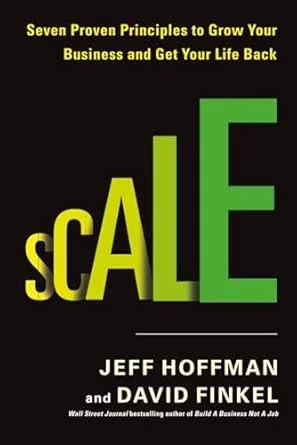
Scale
In Scale, Jeff Hoffman and David Finkel provide a pragmatic roadmap for entrepreneurs looking to grow their businesses without sacrificing their personal lives. By transitioning from a "Level One" startup to a "Level Three" owner-independent company, readers learn to build robust systems, empower teams, and focus on high-leverage strategic work. This summary details the seven principles and five pillars necessary to build a truly scalable, valuable asset.
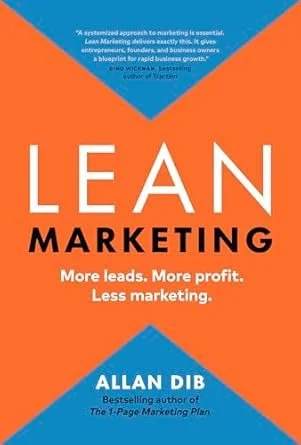
Lean Marketing
In Lean Marketing, Allan Dib applies the principles of lean manufacturing to the world of business growth. He argues that most marketing is bloated and wasteful, urging leaders to focus on "Direct Response" tactics and the "Vital Few" channels that drive ROI. By following his three-phase framework—Before, During, and After—you can automate lead generation and maximize customer lifetime value.

Get Scalable
In Get Scalable, Ryan Deiss provides a pragmatic roadmap for founders trapped by their own success. By implementing a "Scalable Operating System" based on the four core circuits of Strategy, People, Process, and Acceleration, leaders can move from being the bottleneck to the architect. This summary details how to document processes, delegate effectively, and build a business that runs predictably—and profitably—without you.
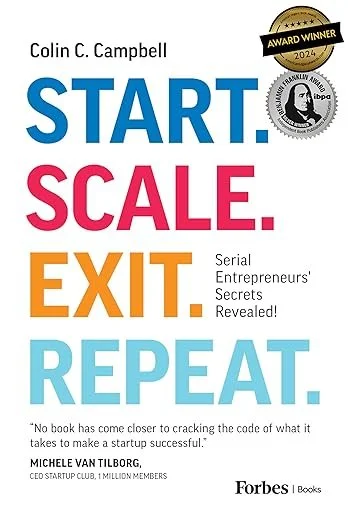
Start. Scale. Exit. Repeat.
In Start. Scale. Exit. Repeat., serial tech entrepreneur Colin C. Campbell reverse-engineers three decades of wins, wipe-outs, and billion-dollar exits into a four-stage blueprint for founders. Drawing on interviews with 30 + venture-backed CEOs and investors—and peppering each chapter with “Golden Nugget” sidebars—Campbell shows how to vet a big idea, fuel fast growth, prepare an investor-pleasing exit, and then begin the cycle again as a wiser, faster, repeat entrepreneur.
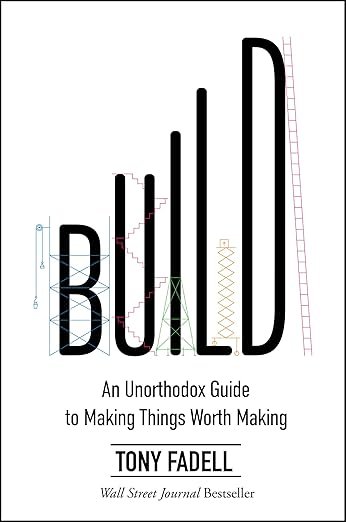
Build
In Build: An Unorthodox Guide to Making Things Worth Making, iPod co-inventor and Nest founder Tony Fadell compresses three decades in Silicon Valley into a blunt, story-rich handbook. From “scratching your own itch” to managing boards, firing bozos, and learning from spectacular failures, Fadell shows builders how to craft world-changing products, assemble cultures that last, and protect their sanity along the way—no MBA jargon, just battle-tested truth.

Nine-Figure Mindset
In Nine-Figure Mindset, Brandon Dawson lays out the principles and philosophies that propelled him from a modest background to a net worth exceeding $100 million. By fusing personal anecdotes with business strategies, Dawson illustrates how the right mindset, unwavering discipline, and a focus on mentorship can catalyze dramatic financial and personal growth—no matter where you’re starting from.

Street Smarts
In Street Smarts: An All-Purpose Tool Kit for Entrepreneurs, Norm Brodsky and Bo Burlingham deliver straight-from-the-trenches insights on every phase of building a business—from raising capital and managing cash flow to scaling without losing your edge. Candid stories and time-tested strategies make this book a must-have guide for startup founders and seasoned entrepreneurs aiming to boost growth and profitability.

Your Multimillion-Dollar Exit
In Your Multimillion-Dollar Exit: The Entrepreneur’s Business Success(ion) Planner, author and exit planning expert walks entrepreneurs through the critical steps of preparing a business for sale. From maximizing valuation to creating a seamless transition plan, this book provides actionable strategies to help founders secure the financial and emotional rewards of their entrepreneurial journey. A must-read for anyone aiming to sell their business for top dollar.

The SaaS Playbook
"The SaaS Playbook" by Rob Walling and Jason Cohen is a comprehensive guide for SaaS entrepreneurs. It covers essential topics like idea validation, pricing strategies, customer acquisition, and scaling your business. With actionable insights and real-world examples, this book provides the roadmap needed to build, grow, and sustain a successful SaaS company. A must-read for anyone in the SaaS space.

Traction
"Traction: Get a Grip on Your Business" by Gino Wickman introduces the Entrepreneurial Operating System (EOS), a practical framework for business success. It focuses on six key areas: Vision, People, Data, Issues, Process, and Traction. Wickman provides tools and strategies to clarify goals, build strong teams, solve problems, and create efficient systems. The book emphasizes consistent execution and accountability to help businesses achieve their vision and drive growth.

Zero To One
Peter Thiel, a notable contrarian in the tech industry and PayPal founder, advocates for groundbreaking innovation over incremental improvements in his book "Zero to One." He champions the belief that making bold, ambitious attempts at innovation, even at the risk of failure, is preferable to safely following the crowd. Thiel emphasizes the importance of questioning conventional wisdom, pursuing vertical progress to create entirely new industries, and establishing monopolies in these new realms. He outlines strategies for identifying unique opportunities through proprietary insights and the significance of the power law in achieving exponential success. Thiel's manifesto is a guide for visionaries to escape the complacency of incrementalism and forge new paths for substantial progress.

The Four Steps To The Epiphany
Most startups fail by developing products nobody wants. Blank provides a roadmap to avoid this:
1.) Customer Discovery to find real problems
2.) Customer Validation to test solutions
3.) Customer Creation to drive adoption
4.) Company Building to scale operations
Steve Blank provides an evidence-based process to turn your entrepreneurial vision into reality in this hit book.

Buy Then Build
In Buy Then Build, Walker Deibel challenges the myth that entrepreneurs must start from scratch. He presents a compelling case for "acquisition entrepreneurship"—buying an existing, profitable business. This approach de-risks the journey by providing immediate cash flow, customers, and proven systems. The book serves as a practical playbook for finding, financing, and growing an existing company, offering a smarter, more direct path to entrepreneurial success.

Founders At Work
Founders at Work by Jessica Livingston demolishes the myth of the overnight success through a series of candid interviews with the creators of companies like Apple, PayPal, and Flickr. The book reveals that the early days of startups are defined not by grand plans, but by scrappy improvisation, dogged persistence, and a fanatical focus on solving a real user problem. It’s an essential, unfiltered look at the messy truth of innovation.

The Minimalist Entrepreneur
In The Minimalist Entrepreneur, Sahil Lavingia challenges the "growth-at-all-costs" startup model. He offers a sustainable playbook for building profitable businesses by doing more with less. The core principles include starting with a community, solving a specific problem, staying lean, and prioritizing profitability from day one. It’s a guide for founders who value purpose and autonomy over chasing venture-backed unicorn status.
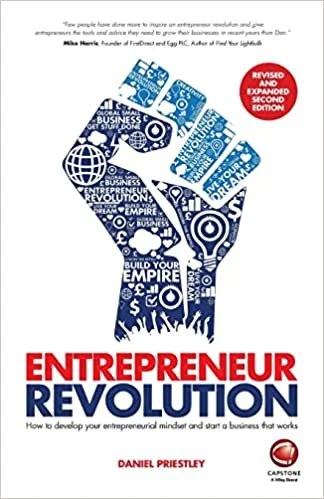
Entrepreneur Revolution
In Entrepreneur Revolution, Daniel Priestley argues that the old social contract of a "safe" corporate job is dead, and the new path to success is through entrepreneurship. He outlines the crucial mindset shifts needed to thrive in the modern, connected economy—moving from trading time for money to building assets. The book provides a 7-stage roadmap for business growth, emphasizing the importance of finding "your people," creating value, and building a business that can ultimately work without you.

The Lean Startup
The Lean Startup by Eric Ries provides a scientific methodology for building successful businesses by avoiding waste.The core of the system is the "Build-Measure-Learn" feedback loop, which cycles through creating a Minimum Viable Product (MVP), measuring how customers respond with actionable metrics, and learning whether to "pivot" or "persevere." This framework prioritizes validated learning over building things nobody wants, helping entrepreneurs navigate uncertainty and find a sustainable business model faster.

The Startup Owner’s Manual
The Startup Owner's Manual by Steve Blank and Bob Dorf is the definitive guide to the Lean Startup movement. It argues that startups are not small versions of big companies, but are temporary organizations designed to search for a repeatable and scalable business model. The book provides the four-step "Customer Development" process—a rigorous, evidence-based methodology that requires founders to "get out of the building" to test their hypotheses and find product/market fit before they scale.

The Membership Economy
In The Membership Economy, Robbie Kellman Baxter provides a playbook for the shift from one-time transactions to ongoing customer relationships. She distinguishes between a simple subscription (a tactic) and a true membership (a relationship based on a "Forever Promise" and a sense of belonging). By focusing on customer-centric strategies for onboarding, engagement, and community building, businesses like Netflix and Peloton create predictable revenue and unbreakable loyalty in an age where access trumps ownership.

Business Model Generation
Business Model Generation by Osterwalder and Pigneur replaces the outdated 50-page business plan with the Business Model Canvas, a one-page visual framework. This tool helps you map, design, and innovate any business model using nine core building blocks, from customer segments to revenue streams. By leveraging patterns like Freemium and Multi-Sided Platforms, it provides a dynamic, hands-on way for entrepreneurs and innovators to visualize and test their ideas.
